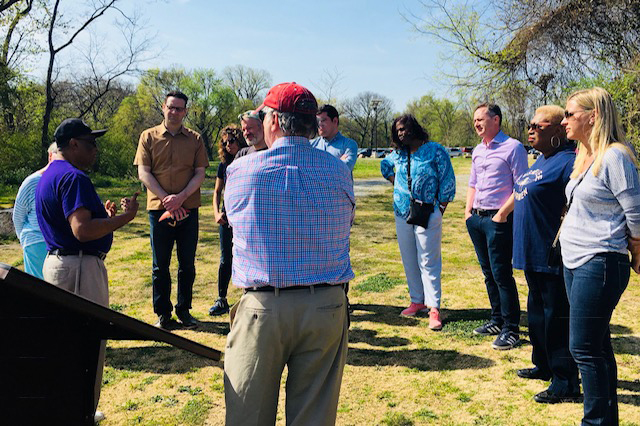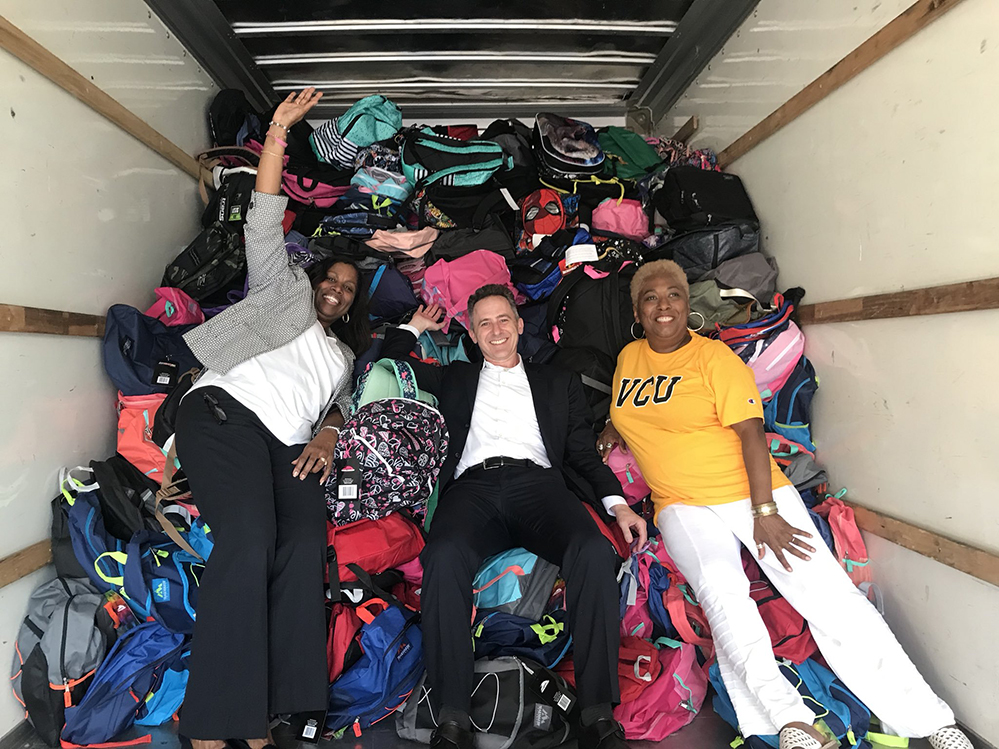Emerging From Michelle Rhee’s Shadow, Jason Kamras Focuses on Building Trust in Racially Charged Richmond Schools

On a sunny Saturday in mid-April, new Richmond Public Schools superintendent Jason Kamras gathered downtown along the banks of the James River with members of the school board. He’d committed to visiting the Richmond Slave Trail in his first 100 days, and now, with his wife and two sons, he stood on the historic site.
At the urging of two local clergyman — one white, one black — Kamras and board members formed a line, put their hands on the shoulders of the person in front of them, and walked for a quarter-mile. It was intended to evoke the way enslaved Africans had to walk on that very spot more than 150 years ago.
“It’s hard to put in words how disturbing that was and how emotional it was for everybody,” said Kamras, who returned to the trail over the summer to kick off training with the district’s principals. “Everyone was very, very struck by that experience, and I think it has stayed with us as we think about the work that we need to do. It’s about undoing the legacy of that injustice.”
This is about more than symbolism for Kamras, the white leader of the majority-black district in the former capital of the Confederacy. After a high-profile and sometimes contentious tenure under Michelle Rhee and Kaya Henderson in Washington, D.C., Kamras has set off as a superintendent for the first time, promising to address racial injustice at its roots and overhaul the city’s underperforming schools.
After getting his start as an administrator from Rhee, who once said that “cooperation, collaboration, and consensus-building are way overrated,” Kamras is now committed to “transparent and inclusive leadership” and has taken to quoting Martin Luther King Jr. on his efforts to build a “beloved community.” He’s still focused on equity and breaking long-standing achievement gaps, but he’s aiming to get there by forging relationships.
Of course, it will take more than just conversations, even difficult ones, to improve Richmond’s schools. One-quarter of its students are chronically absent. The graduation rate is the worst in the state. Nearly half of the 44 district schools lack accreditation, and the state is providing significant oversight.
Given the nagging problems, Kimberly Gray, a former school board member and current city councilor, wants Kamras to focus on what she considers to be more substantive issues.
“It’s a little ironic to have a white superintendent come in and say some of these things,” said Gray, who is biracial. “I think it’s delicate ground and it easily can backfire. I’d be very cautious about the politicking and the rhetoric, and focus on real change.”

For his part, Kamras says his views have “matured over time.”
“I squarely stand in the third way,” he told The 74. “I absolutely believe in accountability and high expectations, and … I also believe that institutionalized racism and generational poverty deeply influence kids’ lives and schools, and so we have to tackle those things as well.”
From D.C., with baggage
Kamras, 44, grew up nearly 3,000 miles from Richmond, in Sacramento, California, where his mother served as a public school teacher. After graduating from Princeton, he signed up in 1996 for Teach For America, landing in D.C. at John Philip Sousa Middle School. By even his critics’ accounts, he was a “terrific teacher” and in 2005 was recognized as National Teacher of the Year.
Two years later, Kamras joined Rhee’s transition team. He went on to help her create IMPACT, the district’s deeply controversial teacher evaluation system. Thomas Toch, who runs FutureED at Georgetown University, wrote last year that IMPACT was “the most comprehensive teacher measurement system ever implemented in public education.” It was high risk (poor reviews could lead to termination) and high reward (strong reviews could result in $25,000 raises). “We want to make great teachers rich,” Kamras told the New York Times. It was introduced simultaneously at all schools and elicited sharp reactions, though recent research shows it boosted student achievement.
Mark Simon, a former teacher who was president of the Montgomery County (Maryland) Education Association, a teachers union, for 18 years, lived in D.C. when Kamras was a DCPS official, and his daughter attended District schools. He engaged Kamras on IMPACT and calls him “a good guy.” But he strongly disagreed with the approach he and Rhee took on evaluation.
“They tried to pretend that poverty made no difference and that all students were equal, and if we could just get teachers to teach all students in the same way, the achievement gap would be eliminated,” said Simon, now a research associate at the Economic Policy Institute. “That was the Michelle Rhee–Kaya Henderson–Jason Kamras philosophy. That was wrong. It sounds like Jason is taking a little bit of the opposite approach now, and that’s a good thing.”
Race in Richmond
In his current position, Kamras does not shy away from talking about race, an issue that continues to loom large in Richmond. In addition to walking the Slave Trail, Kamras asked school board members to read a Langston Hughes poem at a meeting and Martin Luther King’s “Letter From Birmingham Jail” at a retreat. In June, he led the effort to change a school named after a Confederate general to Barack Obama Elementary School.
“I think it’s particularly important for me as a white leader in a school system serving largely students of color that I go out of my way to talk about issues of race,” Kamras said. “Lots of folks in this city have been fighting for racial equity for decades … and sadly, for things to break through, it’s helpful when white leaders stand up and echo what leaders of color have been saying.”
Kamras does some of his talking on Twitter. He’s about as active a user as the Tweeter in Chief, and he tweets early (sometimes at 5:22 a.m.) and often (to mark his 50th day in the job, he tweeted out 50 pictures between 6:32 and 6:58 a.m.).
But Kamras also presses the flesh. In his first 100 days, he did a dozen “Living Room Chats” on Friday nights in families’ homes. He also launched advisory councils with students, teachers, principals, and parents. In his first seven months on the job, he held more than 170 community meetings — on average, 24 meetings a month — to gather feedback for the five-year strategic plan he released in September.
Even though the mayor doesn’t oversee the schools, Kamras has closely allied himself with Mayor Levar Stoney. They meet regularly with the school board chair and city administrator, and Kamras is the first superintendent in recent memory to attend the mayor’s cabinet meetings.
“He seems like he never sleeps,” said Ross Catrow, a public transit advocate in Richmond whose son attends public school there. “He kind of reminds me of a basketball coach who is always out there with his people working hard, and then he’s studying film at night.”
Not every part of Kamras’s first year has been smooth, however. Earlier this month, he unilaterally proposed raising real estate taxes to help fund schools, leading the mayor, most of the city council, and several school board members to distance themselves from him. The Richmond Times-Dispatch editorial board noted its disapproval, calling the suggestion “unreasonable.” And board member Jonathan Young pledged to fight the proposed increase “with every ounce in my body.”
At the beginning of his tenure, Kamras faced controversy when he removed the eight cabinet members he inherited and consolidated the number of senior positions from nine to six. Then he got the board to waive its policy requiring that jobs be posted for at least 10 days. He used the flexibility to propose hiring five people, including three he had worked with in Washington, at significantly higher salaries than their predecessors made and far more than most of them previously earned. Though the fewer number of positions would result in an overall cost savings, several board members balked at offering individual salary increases of as much as $37,000. Board member Young called the new salaries “exorbitant.”
Ultimately, the board approved the measure 5-4.
Dawn Page, the board’s chair, voted in favor of the selections and has publicly backed Kamras’s agenda.
“I’m not saying that everything is peaches and cream, because there’s still a learning curve,” she said. “We’ve had some bumps along the way. We have high expectations, and really, to be honest with you, failure is not an option, because if he fails, the board fails, and our children fail.”
‘Bathroom blitz’
Since he took over in February, Kamras has faced everything from a cheating scandal that led to the resignation of six educators to miscalculated GPAs to some schools running out of toilet paper. He urged the city council and school board to align their separate budgets, and they ended up finding an additional $6.9 million for facilities.
“Who knew we needed to have the teacher of the year, who was a math teacher, to figure out our books?” said Jessee Perry, a Richmond resident who closely follows city and school operations.
Often, the advocate making the loudest fuss about the condition of the schools is Kamras. On his seventh day on the job, he tweeted photos of decrepit school bathrooms, asking, “Would you send your own flesh and blood to a school that looked like this?”
I took these pictures today in one of our schools. Simple question: Would you send your own flesh and blood to a school that looked like this? If not, why should anyone have to? “Injustice anywhere is a threat to justice everywhere.” #RVAKidsCantWait pic.twitter.com/KkPcTECijY
— Jason Kamras (@JasonKamras) February 8, 2018
This summer, he launched a school beautification week, followed by the “Bathroom Blitz,” a two-week sprint with dozens of community partners to repair and refresh as many school bathrooms as possible. Faced with criticism about focusing too much on facilities, Kamras took to Twitter again in August, issuing another provocation: “Would our bathrooms look like this if our students were 100% white?”
I’ve been asked a lot recently why we’re spending so much time and $ on the Bathroom Blitz. This?is why. It’s about treating children with respect & dignity. And it’s about undoing decades of racial injustice. Would our bathrooms look like this if our students were 100% white? pic.twitter.com/uP4770ni2c
— Jason Kamras (@JasonKamras) August 22, 2018
In all, he and his team recruited hundreds of people from more than 30 companies and organizations — from the National Association of Blacks in Criminal Justice to the Jewish Literacy Coalition — who pulled weeds, mowed lawns, and cleaned up bathrooms.
Said board member Young: “He set out to champion and to celebrate those people and/or school business units that were doing well, but at the same time to be a truth teller and to point out that the emperor has no clothes and to fix all of those things that have been broken for so long.”

The condition of the schools leads many parents with means to send their children to private schools. Whites comprise more than 40 percent of Richmond’s 227,000 residents but only 12 percent of its public school students. Race- and class-based inequities within the system persist.
“We have been known to have two school systems, a system within a system, and that’s unacceptable,” said Page, the school board chair.
‘From good to great’
Ultimately, of course, Kamras’s tenure will be judged by whether academic outcomes improve. The strategic plan Kamras released in September, Dreams4RPS, is nothing if not far-reaching. Its 40 proposed actions range from expanding pre-K to creating more integrated schools.
Notably absent is any mention of teacher evaluation. Kamras told the Richmond Times-Dispatch in May that he won’t seek to replicate D.C.’s system in his new role, saying that his “thinking had evolved.”
“I think he has grown dramatically and become a much more supple leader than perhaps he had been early on in his administrative work in D.C.,” Toch, of FutureED, told The 74. “That’s to his credit. That’s what experience and maturity do for you.”
Rhee declined to comment for this article.
Meanwhile, Kamras has work to do to win over teachers. Virginia is a right-to-work state, and Richmond has a “culture that penalized people for whistle-blowing,” said Young. Of a half-dozen teachers contacted for this story, only one responded, and that person was only willing to speak on background, fearing retribution from her supervisors.
But Kamras is proposing to start a one-year training program for new educators and to make teachers in Richmond’s highest-priority schools the best-paid educators in the state. He’s also planning to work with city and state officials on incentives like housing credits, tax credits, and tuition reimbursement to help attract and retain top teachers.
“You can’t fire and hire your way to greatness,” said Kamras, offering a stark contrast with his former boss, Rhee, who once fired a principal as a TV crew recorded. “I truly believe, and most data bears this out, it’s the middle of the distribution that you really need to focus on and help folks go from good to great.”
Kamras is betting that he can lead all of Richmond’s schools to dramatically improve in five years — one conversation at a time. For parents like Catrow who are eager to see progress, the focus on relationships is just fine for now.
“If he was going to come in and say ‘Boom, here’s this high-level stuff we’re working on,’ that would be putting the cart before the horse,” he said. “We have a lot of trust-building to do first.”
Get stories like these delivered straight to your inbox. Sign up for The 74 Newsletter

;)